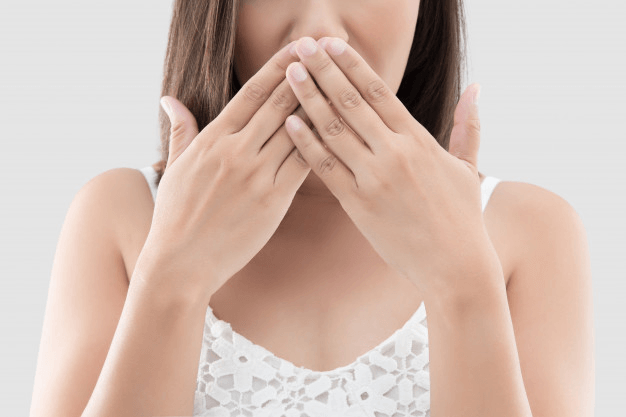10 Tips to Have Fresh Breath
Bad breath is experienced by most people at some time. It may simply be “morning breath” but can be a persistent chronic condition which affects a person’s everyday life and confidence. It is almost always caused initially by poor oral hygiene leading to a build-up of excess bacteria in the mouth which gives off smelly gases. So, contrary to popular belief the following do not usually contribute towards the problem of halitosis: constipation, tonsils, gastro-intestinal problems, and food.
View Top 10 Tips below that will help keep your breath fresh and clean!

Top 10 Tips for Fresh Breath
- Keep your tongue clean: Gently brush it with a soft nylon toothbrush after you brush your teeth.
- Drink More Water! The drier your mouth, the worse your breath gets.
- Keep Calm: Stress makes your breath worse!
- Avoid breath mints and/or gum that contain sugar: These actually make your breath worse.
- Don’t try to kill the odor of bad breath with another odor: This is what most of the ‘Big Name’ oral care companies would like you to believe works.
- Blow your nose more often: Your breath gets worse when you have a cold, allergies, or post-nasal drip.
- Don’t use mouthwash with alcohol or toothpaste that has sodium lauryl sulfate: Many oral care products contain these two ingredients.
- Drink plenty of water when taking prescription medications: Many of these medicines make your mouth extremely dry.
- Stop Smoking: It will give you bad breath instantly and can take years off your life.
- Use Clinically Proven Oxygenating Oral Products: These are the best way to eliminate and prevent bad breath.

Did You Know?
Important things you may not know about bad breath:
- In most cases (about 90%), bad breath comes from the mouth itself.
- Despite public opinion, bad breath rarely comes from the stomach.
- Most people can smell other people’s breath, but have trouble smelling their own. Bad taste is usually not a good indication.
- In the mouth, the most common source of bad breath is the very back of the tongue. Food debris, dead cells, and postnasal drip can accumulate there.
- Bad breath usually increases when the mouth is dry. Chewing sugarless gum for 4-5 minutes at a time can be helpful.
- Gargling right before bedtime with alcohol-free mouthrinses can be effective.
- Eating a hearty and healthy breakfast cleans the mouth and back of the tongue and gets the saliva flowing.
- Some people (maybe 5-7% of the population) have experienced small crumbly ‘stones’ in their mouths that have a foul smell. These are called ‘tonsilloliths’.
- In the large majority of cases, bad breath can be dramatically improved or eliminated.
- Children as young as two or three can have bad breath from postnasal drip, dental plaque, and transient throat infections.

.jpg)



0 Comments